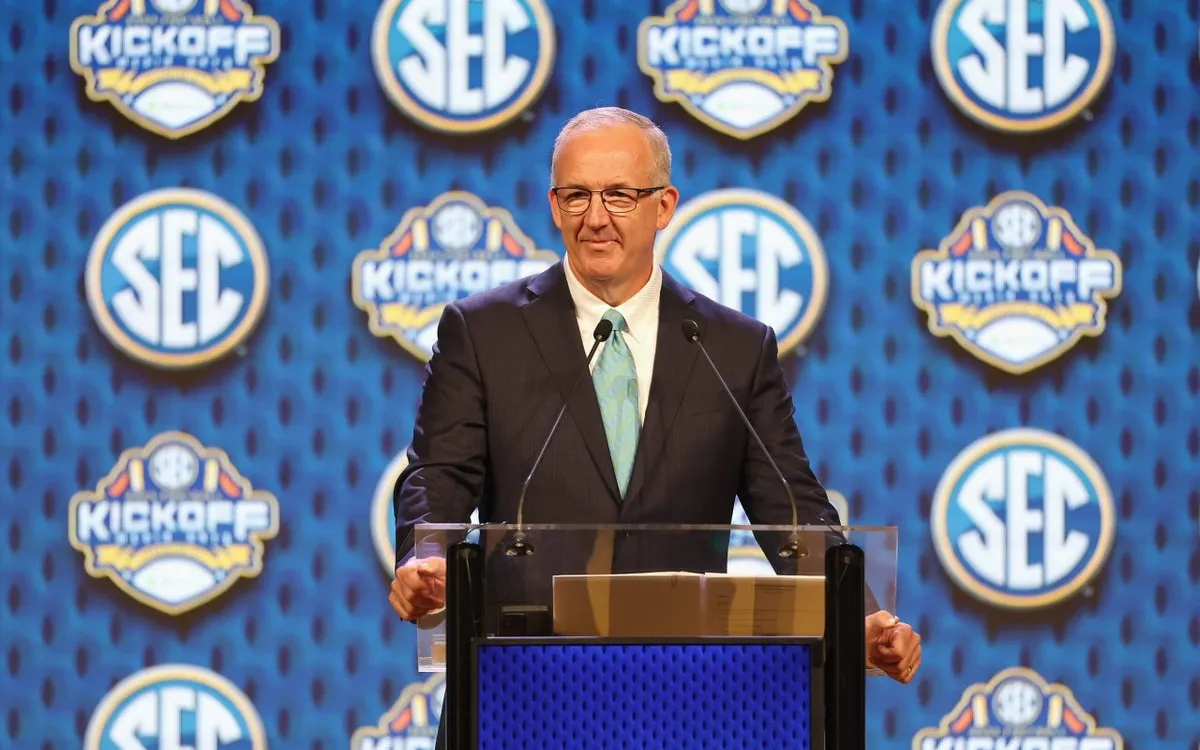
The SEC's decision to finally adopt a nine-conference game schedule is a significant win for fans, the sport of college football, and ESPN's ratings. This change not only enhances the viewing experience for fans but also serves as a strategic maneuver that could potentially mitigate looming challenges within the sport. Most importantly, it may persuade Big Ten Commissioner Tony Petitti to reconsider his controversial proposals regarding the College Football Playoff (CFP).
During the recent Big Ten Media Days, numerous coaches voiced their frustrations about the added pressure of a ninth conference game, arguing that it places them at a disadvantage in the eyes of the selection committee. This sentiment came even as they overlooked the fact that the Big Ten secured more playoff berths than the SEC last season. Petitti and the coaches utilized this narrative to advocate for a 16-team playoff format, which has since ballooned to a proposed 28 teams primarily composed of automatic berths dictated by the league's standings.
“When you get to a system that’s increasing the at-larges and the work of a selection committee, that’s when you need to understand how we’re competing in the regular season,” stated Petitti. He emphasized the math behind the issue, noting, “With 18 schools and nine conference games, we’re losing nine more games to start.” If this is indeed the primary concern, then the long-standing debate over conference scheduling could finally reach a resolution.
SEC Commissioner Greg Sankey has voiced support for a more straightforward playoff structure, advocating for a 5+11 model that includes five automatic qualifiers for conference champions and 11 at-large selections. “We have preferred a 16-team format… with the maximum number of at-large spots,” Sankey reiterated during an appearance on Paul Finebaum’s show.
The SEC's decision to implement a nine-game schedule came swiftly after the CFP announced modifications to the metrics used to evaluate schedule strength, addressing criticisms from the previous season. The updated metrics will place greater emphasis on games against strong opponents and incorporate a new "record strength" metric, which evaluates how teams perform against their schedules. Sankey noted that these adjustments were a significant factor in moving to a nine-game schedule.
With a December 1 deadline looming for potential CFP changes for 2026, the pressure is now on the Big Ten. Petitti and the coaches have received the concessions they were advocating for from the SEC. If the proposed 4-4-2-2-1 format or the 28-team expansion persists, it will reveal that the motivations behind these proposals may have been less about competitive balance and more about creating television inventory.
In light of the SEC’s robust scheduling, some Big Ten schools may need to reevaluate their upcoming matchups. Indiana Coach Curt Cignetti sarcastically defended his school's choice to drop Power 4 non-conference opponents, claiming, “We figured we would just adopt an SEC scheduling philosophy.” However, this comment may not age well as the SEC teams gear up for at least 10 Power 4 games next season, while Indiana faces off against Colorado State, Howard, and Western Kentucky.
At the same media event, Penn State Coach James Franklin criticized the Big Ten's move to nine conference games, labeling it “maybe the worst decision the Big Ten has ever made.” In 2026, his team will be competing in those nine games alongside matchups against Marshall, Temple, and Buffalo. In contrast, Alabama will face nine SEC opponents along with West Virginia and Florida State.
Despite ongoing complaints about the balance of conference games and the presence of FCS teams in November, statistical analyses consistently show that the SEC's schedules rank among the toughest in the nation. By adding an extra Power 4 opponent, the competitive gap is likely to widen further. It remains to be seen how the selection committee will respond to these changes. However, if SEC schools are willing to embrace this rigorous scheduling less than a year after securing only three playoff berths, the Big Ten and Commissioner Petitti will have no valid argument against their approach.